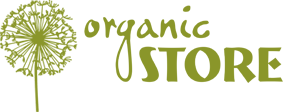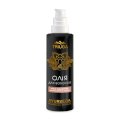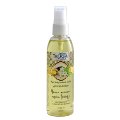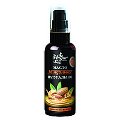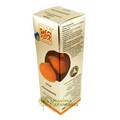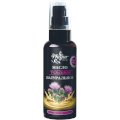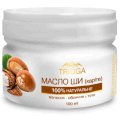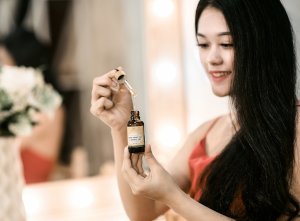 The hair benefits of natural vegetable oils have long been known; in many cultures, women have used oils to make their hair stronger, thicker and shinier for centuries. When it comes to taking care of damaged hair, carrier oils are often named among the best remedies. Check out our list of five best natural oils for damaged hair.
The hair benefits of natural vegetable oils have long been known; in many cultures, women have used oils to make their hair stronger, thicker and shinier for centuries. When it comes to taking care of damaged hair, carrier oils are often named among the best remedies. Check out our list of five best natural oils for damaged hair.
All natural carrier oils have a wide range of useful properties. The best oils for taking care of damaged hair should have pronounced moisturising, nourishing, regenerative and protective properties because damaged hair needs hydration, nutrients, repairing and protection from the environment. As a rule, these properties are directly tied to the chemical composition of a particular carrier oil.
Carrier oils are primarily composed of triglycerides, which are derivatives of fatty acids and glycerol. Certain types of triglycerides are important for biological processes in human body. Fatty acids and their triglycerides are generally divided into two types: saturated and unsaturated. Most carrier oils are composed of both types of fatty acids. Depending on the proportions and types of fatty acids it contains, each carrier oils has a unique fatty acid profile.
The best oils for damaged hair contain both saturated and unsaturated fats. Here’s our list of carrier oils that have the best fatty acids profiles for taking care of weak and damaged hair.
Argan Oil
Argan oil is produced from the kernels of the argan tree that is endemic to Morocco. It consists mostly of oleic acid, linoleic acid, palmitic acid, stearic acid and linolenic acid. The oil also contains tocopherols (vitamin E), carotenoids (vitamin A precursors), ferulic acid, polyphenols, phytosterols, triterpenes, and squalene (a potent natural antioxidant and moisturising agent). Thanks to its chemical composition, argan oil effectively repairs damaged hair structure, helps to provide hair follicles with nutrients and oxygen, reduces hair loss, produces an anti-inflammatory and antibacterial effect on the scalp, and helps to normalise sebum secretion.
Olive Oil
The fatty acid profile of olive oil is characterised by a high content of oleic acid (up to 70%); it also contains linoleic acid, palmitic acid, stearic acid, alpha-linolenic acid, polyphenols, vitamins A, D, E and K, and dietary minerals (calcium, sodium, potassium, iron and phosphorus). When used to take care of damaged hair, olive oil repairs and strengthens its structure from root to tip, moisturises the scalp, and protects weakened hair from environmental stressors.
Avocado Oil
Like olive oil, avocado oil is characterised by a high content of oleic acid, which can make up approximately 52-66% of its fatty acid profile. This oil also contains palmitic acid, linoleic acid, palmitoleic acid, linolenic acid, stearic acid, vitamins A, B, C, D and E, minerals (magnesium, potassium, phosphorus, iron, calcium, sodium, zinc, manganese, copper, iodine and cobalt), histidine, phytosterols and squalene. When applied to damaged hair, avocado oil restores its healthy shine, prevents dehydration, makes the hair more manageable and reduces breakage, prevent split ends, and strengthens hair roots, reducing hair loss.
Macadamia Oil
Macadamia oil is made from the nuts of macadamia, a plant native to Australia. Like the other three oils that are described above, it has a high content of oleic acid (about 60%). Macadamia oil also contains palmitoleic acid, stearic acid, myristic acid, palmitic acid, linoleic acid, arachidic acid, gadoleic acid, and behenic acid. When used as a damaged hair treatment, this oil produces a repairing effect, strengthens hair structure from root to tip, helps to lock in moisture, makes the hair softer and more manageable. In addition, macadamia oil nourishes hair follicles, as well as moisturises and softens the scalp.
Jojoba Oil
Despite its name, jojoba oil is not a true vegetable oil; it’s a liquid wax. While true oils are composed of triglyceride esters of fatty acids, jojoba oil contains mostly wax esters (mono-esters of fatty acids and fatty alcohols) and just a tiny fraction of triglycerides. Fatty acids present in jojoba oil include 11-eicosenoic acid (gondoic acid), erucic acid, oleic acid, nervonic acid, palmitic acid, palmitoleic acid, stearic acid, lignoceric acid, and trace amounts of behenic acid. Besides, jojoba oil is noted for its high vitamin E content. This oil restores the thickness and smoothness of the hair, actively hydrates it, and prevents brittle hair and split ends.
Of course, these are not the only natural oils that can be used to take care of damaged hair. Other oils with hair restorative properties include coconut oil, sea buckthorn oil, sweet almond oil, shea (karite) butter, burdock oil, amla (Indian gooseberry) oil, and many more. In our online shop Organic Store, you can buy these and other cosmetic oils for a reasonable price. We offer secure and convenient payment methods and deliver internationally to most parts of the world.
